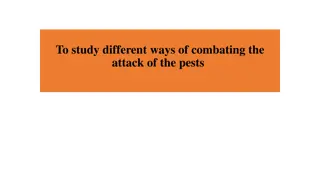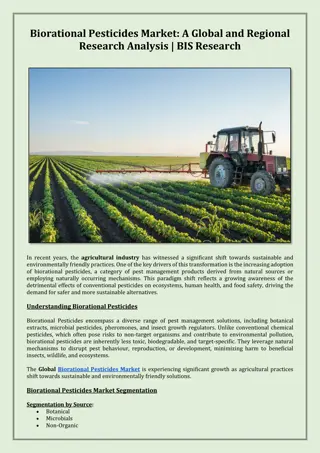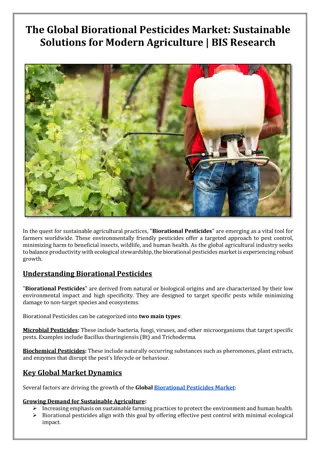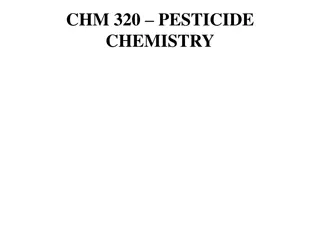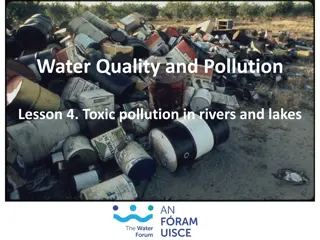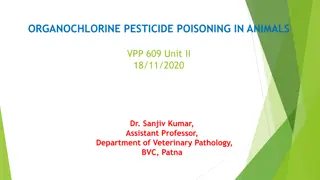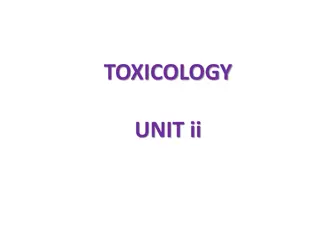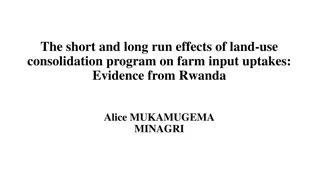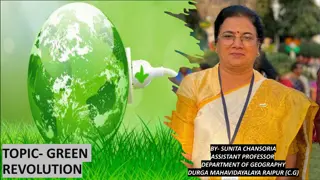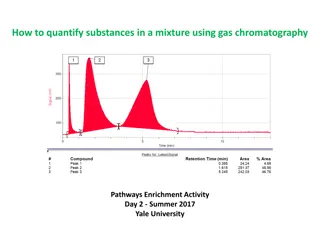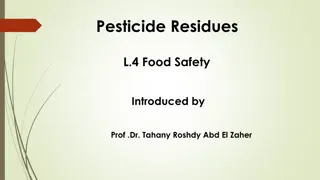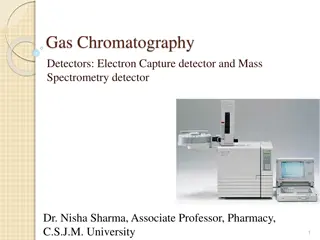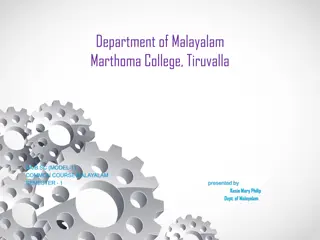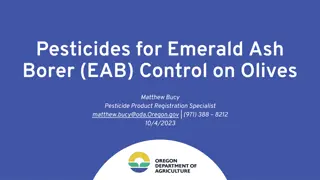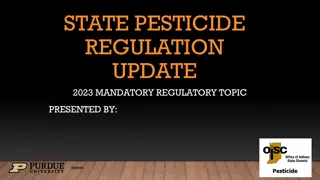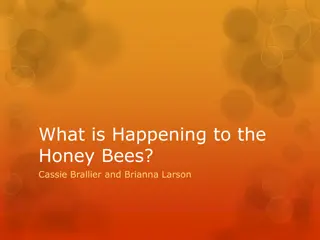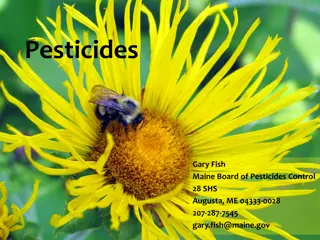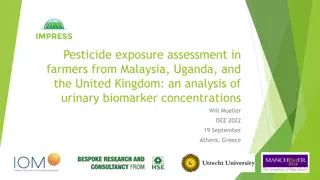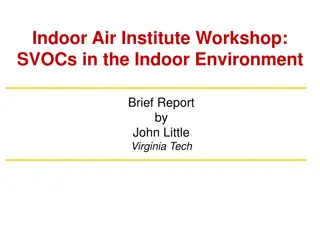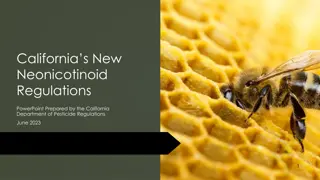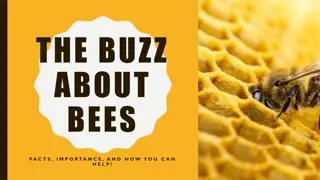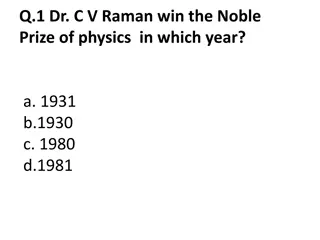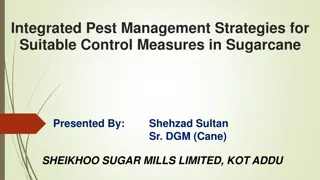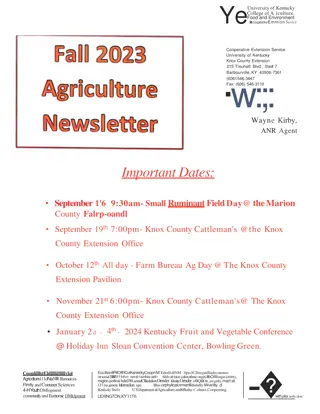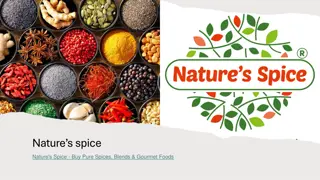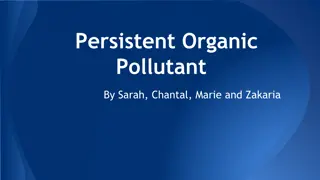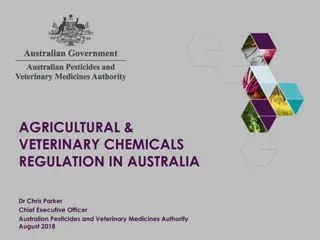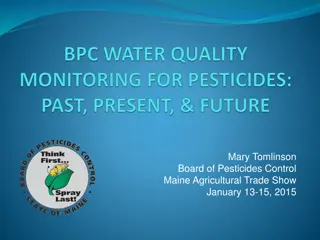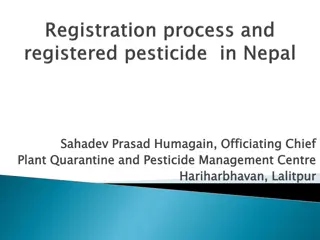Revolutionizing Agriculture with Drone Technology in India
Exploring the current and future landscape of drone technology in India, specifically its impact on agriculture. From the use of drones for spraying pesticides to the government's initiative of providing drones to women's self-help groups, the potential benefits for farmers are immense. Experts beli
1 views • 82 slides
Recycling of Animal Washings and Waste in Fodder Production
Animal waste, including excrement and washings, can be recycled to enhance fodder production. By using animal waste as organic mulch or pesticides, farmers can improve soil fertility and crop yield in sustainable agriculture practices. This method also supports organic farming, with benefits for bot
0 views • 14 slides
Innovative Methods for Pest Control in Agriculture
Explore various environmentally-friendly strategies to combat pest attacks in agricultural settings. Discover techniques such as biological pest control, cultural control, trap cropping, and the use of resistant varieties to reduce reliance on chemical pesticides and promote sustainable farming prac
1 views • 9 slides
The Benefits of Organic Goat Mowing for Your Lawn
Discover the advantages of using goats for lawn mowing, including cost savings, environmental benefits, weed control, and natural fertilization. Goats offer a sustainable and efficient way to maintain your property while reducing the need for pesticides and herbicides. Embrace a greener approach to
2 views • 14 slides
Biorational Pesticides Market: A Global and Regional Research Analysis
The Global Biorational Pesticides Market is experiencing significant growth as agricultural practices shift towards sustainable and environmentally friendly solutions.
11 views • 3 slides
Global Biorational Pesticides Market: Sustainable Solution in Modern Agriculture
The Global Biorational Pesticides Market is experiencing significant growth as agricultural practices shift towards sustainable and environmentally friendly solutions. Biorational pesticides are a category of pest management products derived from natural materials, such as plants, microorganisms, an
0 views • 3 slides
Understanding Pesticide Chemistry and Their Importance in Agriculture
Pesticides are essential for controlling pests, diseases, and microbes that harm plants. They include insecticides, herbicides, rodenticides, bacteriocides, nematocides, molluscides, algicides, and fungicides. Integrated pest management is crucial for effective pest control in agriculture.
0 views • 89 slides
Understanding Toxic Pollution in Rivers and Lakes
Toxic pollution in rivers and lakes is a pressing environmental issue caused by various pollutants such as metals, pesticides, chemicals, and microbial contaminants. These pollutants can have detrimental effects on aquatic life, human water use, and health. Learn about the impact of toxic pollutants
2 views • 20 slides
Understanding Organochlorine Pesticide Poisoning in Animals
Organochlorines are synthetic pesticides with high toxicity and slow degradation, posing a threat to both target and non-target species. Despite bans in developed countries, their use persists, leading to environmental persistence and bioaccumulation. Natural sources also contribute to organochlorin
0 views • 24 slides
Overview of Toxicology: Understanding Chemical Risks and Health Impacts
Toxicology is a crucial field that assesses the effects of various toxic substances on human health and the environment. From heavy metals to solvents, radiation, pesticides, and animal toxins, this discipline plays a vital role in identifying and managing risks associated with exposure to harmful c
0 views • 25 slides
Impact of Land-Use Consolidation Program on Farm Inputs in Rwanda
The study evaluates the effects of Rwanda's land-use consolidation program on farm input uptakes, specifically focusing on hybrid seeds, inorganic fertilizers, and pesticides. Results show significant increases in the adoption of hybrid seeds and inorganic fertilizers among participating households
0 views • 10 slides
Green Revolution: Transforming Agriculture for a Sustainable Future
The Green Revolution marked a significant period in global agriculture with the introduction of new technologies like chemical fertilizers, pesticides, and high-yielding seeds. This revolution, attributed to Norman Borlaug, boosted crop productivity, ensured food security, and saved millions from fa
2 views • 11 slides
Quantifying Substances in Mixtures Using Gas Chromatography
Gas chromatography is a precise method to quantify substances in mixtures, essential for various applications like food quality analysis, blood alcohol content testing, and developing green energy technologies. By accurately determining the identity and quantity of substances, such as pesticides in
2 views • 29 slides
Ensuring Success in Agricultural Research Trials: A Guide for Farmers
Explore the key steps involved in conducting research trials for testing new agricultural products and techniques. Learn from experts on how to plan, commit, and avoid wasted efforts in your farm experiments. Discover the significance of trial biostimulants, fertilizers, biopesticides, and chemical
0 views • 45 slides
Extraction Methods in Pesticide Residue Analysis for Food Safety
Extraction methods play a crucial role in separating pesticide residues from food matrices for analysis. Techniques involve using solvents to efficiently remove pesticides without causing chemical changes. The choice of extraction method depends on the substrate type, with liquid and solid substrate
6 views • 25 slides
Professional Pest Control Services in Baulkham Hills and Bella Vista
We offer the safest pest control at Bella Vista & Baulkham Hills properties, thanks to the use of the latest pesticides from renowned brands that pose no harm to human or pet health and environment.\u00a0
4 views • 6 slides
Understanding Electron Capture Detector in Gas Chromatography
Gas Chromatography Detectors include the Electron Capture Detector (ECD), which detects ions exiting the chromatographic column by the anode electrode. It is commonly used for halogenated organics like insecticides and pesticides. The ECD works by capturing electrons from the carrier gas, leading to
1 views • 12 slides
Department of Malayalam Marthoma College, Tiruvalla - Malayalam Semester-1
Department of Malayalam at Marthoma College, Tiruvalla offers a BA/B.Sc. (Model 1) Common Course in Malayalam for Semester 1. The course includes the study of Malayalam literature and culture. Enmakaje and Valiya Chirakulla Pakshikal are two prominent works discussed, focusing on environmental issue
5 views • 7 slides
Effective Pesticides for Emerald Ash Borer Control on Olives - Regulatory Guidelines
EPA and ODA co-regulate pesticides under FIFRA and Oregon Pesticide Control Act. FIFRA Section 2(ee) allows products to target pests not listed on the label under certain conditions. Food uses require tolerance establishment. Potential options like FIFRA Sec. 24(c) address special local needs for no
1 views • 15 slides
State Pesticide Regulation Update 2023: Mandatory Changes and Stakeholder Involvement
The State Pesticide Regulation Update for 2023 brings significant changes including Restricted Use Pesticide applications, record-keeping requirements, and supervision of applicators. The revisions were prompted by applicator certification and training rules set by the EPA, along with public awarene
0 views • 25 slides
The Devastating Impact of Colony Collapse Disorder on Honey Bees
A profound look into the catastrophic effects of Colony Collapse Disorder (CCD) on honey bee populations, causing the loss of millions of beehives and threatening crop pollination. Scientists attribute CCD to a deadly mix of fungicides and pesticides found in pollen samples, disrupting bees' neurolo
0 views • 6 slides
Honey Bee Exposure to Pesticides: Routes and Impacts
Analysis by the U.S. Environmental Protection Agency outlines various exposure routes of honey bees to pesticides, including contact with contaminated sources like foliage and soil, ingestion of contaminated pollen and nectar, and inhalation of chemical droplets. Different application types and age
2 views • 13 slides
Understanding Pesticide Use and Impact on Pollinators
Pesticides play a crucial role in agricultural production in areas like New Hampshire and Maine. However, their use raises concerns about potential hazards, especially for pollinators like bees. Different types of formulations and tank mixes carry varying risks to these essential insects. It is impo
0 views • 36 slides
Pesticide Exposure Assessment in Farmers from Malaysia, Uganda, and the United Kingdom
This study evaluates the impact of pesticide exposure on farmers' health in Malaysia, Uganda, and the UK using urinary biomarker concentrations. Multiple cohorts are analyzed to assess associations between exposure-modifying factors and urine metabolite measurements. The IMPRESS project focuses on i
0 views • 12 slides
Indoor Air Institute Workshop on SVOCs in the Indoor Environment
The Indoor Air Institute Workshop focused on Semi-Volatile Organic Compounds (SVOCs) such as plasticizers, flame retardants, and pesticides that are prevalent indoors, posing health concerns like endocrine disruption. The workshop aimed to understand the source-to-effect continuum, risk assessment a
0 views • 28 slides
New Regulations on Neonicotinoids in California: An Overview
The presentation by the California Department of Pesticide Regulations highlights the new regulations on neonicotinoids, systemic pesticides affecting insects' central nervous systems. It provides insights into the history of neonicotinoid use in California, the development of alternative pesticides
0 views • 19 slides
Enhancing Pesticide Spray Effectiveness with Adjuvants for Rosarians
Adjuvants play a crucial role in improving the efficacy of pesticide applications for rosarians. They aid in maximizing the impact of pesticides by enhancing their application process. Various types of adjuvants, such as surfactants, extenders, and penetrants, serve different purposes like adjusting
0 views • 11 slides
The Buzz About Bees: Facts, Importance, and How You Can Help!
Bees play a crucial role in our ecosystem and food supply, with over 20,000 species aiding in pollination. Sadly, bee populations are declining due to various factors like climate change, pesticides, and habitat loss. Understanding the significance of bees, their pollination process, and the risks t
0 views • 11 slides
General Knowledge Quiz on Science, History, and Geography
Test your knowledge with this quiz covering topics like Nobel Prize winners, chemical formulas, color blindness, international organizations, sports events, beauty pageants, and banned pesticides. Challenge yourself and learn fun facts along the way!
0 views • 70 slides
Integrated Pest Management Strategies in Sugarcane for Sustainable Crop Production
The concept of Integrated Pest Management (IPM) in sugarcane production focuses on using a combination of techniques to manage pest populations sustainably. This approach considers the biology and behavior of pests and aims to reduce reliance on chemical pesticides while promoting environmentally-fr
1 views • 21 slides
Best Management Practices for Homeowners Using Pesticides
Pesticides are important tools for managing pests, but using them correctly is crucial for safety and effectiveness. Homeowners should follow best management practices, such as reading and understanding label instructions, using pesticides only when needed, and selecting products with low toxicity.
0 views • 10 slides
Essential Facilities in a Bio-Pesticide Laboratory for Smart Agriculture
Establishing a bio-pesticide laboratory is vital for research, development, and mass production of bio-pesticides. Key rooms include sterilization, media preparation, inoculation, growth chamber, mixing, insect rearing, and washing rooms. The sterilization room houses equipment like autoclave and ho
0 views • 10 slides
Fish Masala know everything about fish masala
Organic Fish Masala is a carefully curated blend of premium organic spices meticulously selected to elevate the flavor profile of fish dishes. This masala blend is crafted without chemicals or pesticides, ensuring purity and maintaining the natural e
0 views • 7 slides
Understanding Pest Control and Types of Pesticides
Pest control is crucial to safeguarding health and property by managing pests like rodents, insects, and more. Various pest control methods are utilized to alleviate infestations. Moreover, different types of pesticides, such as insecticides and herbicides, are employed for pest management, each wit
0 views • 13 slides
Understanding Land Use Management and Its Impact on Fertility
Humans have utilized land for various needs over time, evolving from agriculture to encompass municipal, transportation, energy, recreational, and waste management. Land use management is crucial for maintaining soil fertility and preventing erosion and pollution. Factors affecting soil/land fertili
0 views • 10 slides
Understanding Persistent Organic Pollutants and Their Impact
Persistent Organic Pollutants (POPs) are chemical substances that remain in the environment, bioaccumulate through food chains, and pose risks to human health and the environment. Examples include pesticides like DDT, industrial pollutants such as PCBs, and unintentional by-products like dioxins. In
0 views • 30 slides
Agricultural and Veterinary Chemicals Regulation in Australia - Overview
The regulation of agricultural and veterinary chemicals in Australia is overseen by the Australian Pesticides and Veterinary Medicines Authority (APVMA), established in 1993. The APVMA is responsible for assessing and registering pesticides and veterinary medicines to ensure their safety and effecti
0 views • 15 slides
Exploring Pesticide Monitoring and Contamination Studies in Maine
Mary Tomlinson's work with the Maine Board of Pesticides Control includes past studies on groundwater and surface water monitoring, ongoing monitoring initiatives, and future collaborative studies. The State Law mandates residue surveys to identify possible contamination sources and develop a pestic
1 views • 55 slides
Procedures and Management of Pesticide Registration in Nepal
This content provides detailed information on the registration procedures, management, and regulation of pesticides in Nepal. It covers the registration method, advantages of analogous registration, banned pesticides list, types of pesticides, and essential documentation requirements for pesticide r
0 views • 43 slides
Bio-Pesticides and Bio-Control Agents in Microbiology
Bacteria can infect various organisms, and some can be beneficial as bio-control agents against pests. Pseudomonas species and Bacillus thuringiensis are commonly used as bio-pesticides due to their abilities to inhibit pathogens and control insect populations effectively in agriculture.
0 views • 11 slides


